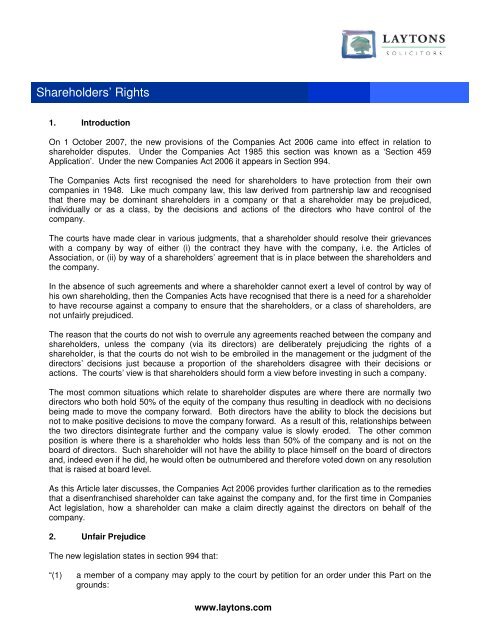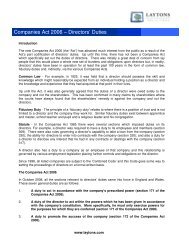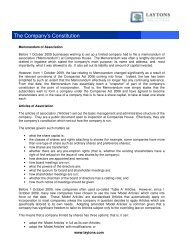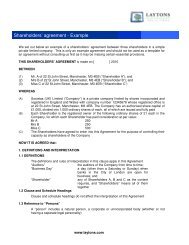Shareholders' Rights - Shareholder's Rights
Shareholders' Rights - Shareholder's Rights
Shareholders' Rights - Shareholder's Rights
Create successful ePaper yourself
Turn your PDF publications into a flip-book with our unique Google optimized e-Paper software.
Shareholders’ <strong>Rights</strong>1. IntroductionOn 1 October 2007, the new provisions of the Companies Act 2006 came into effect in relation toshareholder disputes. Under the Companies Act 1985 this section was known as a ‘Section 459Application’. Under the new Companies Act 2006 it appears in Section 994.The Companies Acts first recognised the need for shareholders to have protection from their owncompanies in 1948. Like much company law, this law derived from partnership law and recognisedthat there may be dominant shareholders in a company or that a shareholder may be prejudiced,individually or as a class, by the decisions and actions of the directors who have control of thecompany.The courts have made clear in various judgments, that a shareholder should resolve their grievanceswith a company by way of either (i) the contract they have with the company, i.e. the Articles ofAssociation, or (ii) by way of a shareholders’ agreement that is in place between the shareholders andthe company.In the absence of such agreements and where a shareholder cannot exert a level of control by way ofhis own shareholding, then the Companies Acts have recognised that there is a need for a shareholderto have recourse against a company to ensure that the shareholders, or a class of shareholders, arenot unfairly prejudiced.The reason that the courts do not wish to overrule any agreements reached between the company andshareholders, unless the company (via its directors) are deliberately prejudicing the rights of ashareholder, is that the courts do not wish to be embroiled in the management or the judgment of thedirectors’ decisions just because a proportion of the shareholders disagree with their decisions oractions. The courts’ view is that shareholders should form a view before investing in such a company.The most common situations which relate to shareholder disputes are where there are normally twodirectors who both hold 50% of the equity of the company thus resulting in deadlock with no decisionsbeing made to move the company forward. Both directors have the ability to block the decisions butnot to make positive decisions to move the company forward. As a result of this, relationships betweenthe two directors disintegrate further and the company value is slowly eroded. The other commonposition is where there is a shareholder who holds less than 50% of the company and is not on theboard of directors. Such shareholder will not have the ability to place himself on the board of directorsand, indeed even if he did, he would often be outnumbered and therefore voted down on any resolutionthat is raised at board level.As this Article later discusses, the Companies Act 2006 provides further clarification as to the remediesthat a disenfranchised shareholder can take against the company and, for the first time in CompaniesAct legislation, how a shareholder can make a claim directly against the directors on behalf of thecompany.2. Unfair PrejudiceThe new legislation states in section 994 that:“(1) a member of a company may apply to the court by petition for an order under this Part on thegrounds:8613516v2/SHARED - LAYTONSwww.laytons.com
(a)(b)that the company’s affairs are being or have been conducted in a manner that isunfairly prejudicial to the interests of members generally or as some part of itsmembers (including at least himself), orthat an actual proposed act or omission of the company (including an act or omissionon its behalf) is, or would be so prejudicial”The section continues in two further parts with two other sub-sections, however the essence of theshareholder protection is contained in the above subsection.The essence of section 994 is, the same as section 459 of The Companies Act 1985. We would,however, wish to take the opportunity to discuss some of the key issues of the new section as theyapply to its practical use.2.1 StandingIt is necessary for the person commencing a petition under section 994, to be a member of thecompany. Many parties do not appreciate that it is a principle of law that there must be a directrelationship between the individual commencing the proceedings and the respondent to suchproceedings. If a shareholder was to sue a director directly that would not be seen as a directrelationship (however we will discuss derivative claims towards the end of this article which rebuts thisview). The direct route would be for a shareholder to sue the company. It would then be for thecompany to determine whether to sue the directors of the company. However, we are sure you canalready appreciate the impracticality of such a situation when very often the directors whom ashareholder wishes to complain about control the board of directors and hold the majority of shares inthe capital of the company. For this reason, a claim under section 994 allows the court to have a widediscretion into how the company should proceed and indeed, it can also order the sale of thedisenfranchised shareholder’s shares to the other shareholders or order the majority shareholders tosell their shares to the disenfranchised shareholder. We will discuss more in relation to remediesunder section 994 at a later stage in this Article.We would also wish to point out that many people believe that section 994 is only applicable in relationto “minority” shareholders. You will note from the section above that there is no reference to a“minority” and therefore it is technically possible for a majority shareholder to commence proceedings.From a practical point though, such a majority shareholder would also have the right to stop anycircumstances arising which would result in a dispute and a petition under this section via exercisinghis shareholding. It is, however, possible for a shareholder who has an equal shareholding to the othershareholders to use these particular provisions.We would also wish to point out that if a shareholder is only beneficially entitled to shares, (i.e. they area beneficiary under a trust), they are not entitled to commence proceedings and it must be the trustee(i.e. the legal owner of the shares) who commences such proceedings.2.2 Unfairly PrejudicialThese two words are not to be treated on an either/or basis. Conduct that is unfair but which does notnecessarily cause prejudice; similarly prejudice that is caused by conduct which is not unfair are bothnot actionable. The petitioner must demonstrate unfair conduct that has prejudiced them as ashareholder.While this may sound like a semantic point, it is actually very practical. For example, this section is notthere to be utilised by a shareholder who wishes to complain about the poor management of thedirectors i.e. when the share price falls. While this is clearly prejudicial to that shareholder’s position(via his share value), the situation is not unfair and indeed all shareholders will be treated equally, i.e.all of their share price will be reduced. It is a case of bad management not unfair treatment. Similarly,there may be a situation where it could be considered that the actions of the directors are unfair but itmay not be prejudicial to the shareholders. An example of this may be an investment by the companythat a shareholder may ethically disagree with but that adds value to their shares.8613516v2/SHARED - LAYTONSwww.laytons.com
2.3 Legitimate ExpectationsThe expectations of an individual investing in a large listed company are very different from thoseinvesting in a small private limited company where, very often, the directors and the shareholders arethe same people. The legitimate expectations of an individual working in a private limited companymay well be not only to obtain a dividend or an increase in share price, but also to be employed by thatcompany to receive a salary. Therefore, if they are removed as a director and excluded from themanagement of the company - while this does not affect their shareholding - it is unfairly prejudicial totheir interest as a member as the two are clearly intertwined.2.4 ReliefThe relief that can be granted by a court pursuant to a section 994 application is set out in section 996of the Companies Act 2006 and is very similar to the relief that could be obtained in section 459. Therelief that can be ordered is as follows:1. regulate the conduct of the company’s affairs in the futurea) this can merely be a new rule book as to how the company should deal with a particular issueor a wider reaching set of rules in relation to the conduct of the company and indeed thedirectors who are managing the company;b) require the company to:I. refrain from doing or continuing the act complained of by the petitioner; orII. to do an act that the petitioner has complained that the company has omitted to do;c) authorise civil proceedings to be brought in the name and on behalf of the company by suchperson or persons (normally the petitioner) and on such terms as the court may direct. Thiswill normally mean that the company can commence proceedings against an individualdirector or, indeed, that the company should commence proceedings against anothercompany or individual to which or to whom one of the directors is connected;d) require the company not to make any, or any specified alterations, in its Articles without thepermission of the court, such alterations are normally made to the detriment of the individualshareholders and may include the ability for the directors to allot shares and therefore dilutethe petitioning shareholderse) provide for the purchase of the shares of any members of the company by other members ofthe company or by the company itself and in the case of purchase by the company itself areduction of the Company’s capital accordingly. In reality, this is the most commonly usedrelief granted by the court. This means that the court can order that the other shareholders, orthe company itself, buy the minority shareholders’ shares or that the minority shareholder isentitled to buy the majority shareholders’ shares. This is the most commonly used provisionas a court recognises that the shareholders cannot continue to act together as it does notbenefit the company or the purpose for which they first set the company up. The court willnormally order that the company shares should be valued by an independent expert in orderthat the share price is “fair” and a court will also order from what date the share price shouldbe valued. This may be because the company has, possibly deliberately, been run down bythe directors who are ensuring the company prejudices the minority shareholder.3. Quasi PartnershipsWhat the Companies Act 2006 does not remove is a petitioner’s ability to claim that a quasipartnershipexists between the shareholders of a company. Effectively a quasi-partnershipconsists of a group of individuals that run the business as though it were a partnershipalthough, for reasons of advice or convenience, it is operated through a limited company. Thesignificance of a quasi partnership is that the courts treat minority shareholders in such acompany in a more favourable light – such shareholders often being able to claim protection8613516v2/SHARED - LAYTONSwww.laytons.com
from being excluded from the management of that company or from being removed as ashareholder (unless there is a good reason for doing so).Author: Barney Leaf (barney.leaf@laytons.com)March 20108613516v2/SHARED - LAYTONSwww.laytons.com






